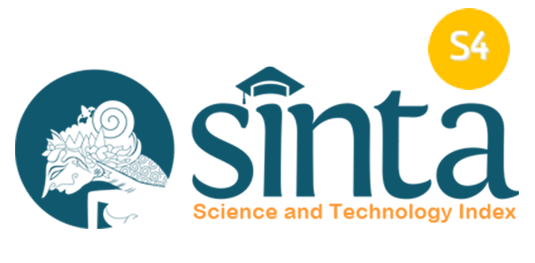Identification of students’ misconceptions in proving onto and one-to-one function in abstract algebra using certainty response index
Abstract
This research is aimed to identify students’ misconceptions in proving onto and one-to-one function in Abstract Algebra using CRI (Certainty Response Index), which is an instrument to distinguish misconceptions and errors. This research uses qualitative method. There are eighteen research participants, and they are Mathematics Education students in 3rd semester. Researcher asked participants to solve some problems related to mathematical proof. Then, participants gave score based on their belief or level of certainty. The result shows that ten students get misconceptions. They were weak in understanding the definition of onto and one-to-one function, and are not yet trained to proof onto and one-to-one function in Abstract Algebra. Further, this research also find that the errors of participants in proving mathematics are mainly influenced by errors in algebraic operation.
Keywords
Full Text:
PDFReferences
Boero, P., Fenaroli, G., & Guala, E. (2018). Mathematical argumentation in elementary teacher education: The key role of the cultural analysis of the content. In A. J. Stylianides & G. Harel (Eds.), Advances in mathematics education research on proof and proving (pp. 49-67). Cham, Switzerland: Springer International Publishing.
Creswell, J.W. (2012). Educational research: Planning, conducting, and evaluating quantitative and qualitative research (4th Ed.). Boston, MA: Pearson.
Dawkins, P. C., & Weber, K. (2017). Values and norms of proof for mathematicians and students. Educational Studies in Mathematics, 95(2), 123-142.
Dulock, H. L. (1993). Research design: Descriptive research. Journal of Pediatric Oncology Nursing, 10(4), 154-157.
Gilbert, L., & Gilbert, J. (2009). Elements of modern algebra. USA: Cengage Learning.
Griffin, P., McGaw, B., & Care, E (2012). Assessment and teaching of 21st century skills. Dordrecht, Netherlands: Springer.
Hammer, D. (1996). Misconceptions or p-prims: How alternative perspectives of cognitive structure influence instructional perceptions and intentions. The Journal of the learning science 5, 97-127.
Hasan, S., Bagayoko, D., & Kelley, E. L. (1999). Misconceptions and the certainty of response index (CRI). Physics education, 34(5), 294.
Holmes, V., Miedema, C., & Haugen, N. (2013). Data-driven intervention: Correcting Mathematics Students’ Misconceptions, Not Mistakes. Mathematics Educator, 23(1), 24–44.
Lesseig, K. (2016). Investigating mathematical knowledge for teaching proof in professional development. International Journal of Research in Education and Science, 2(2), 253-270.
Li, X. (2010). Cognitive analysis of students' errors and misconceptions in variables, equations, and functions (Doctoral dissertation). College Station, Texas: Texas A & M University.
Mata-Pereira, J., & da Ponte, J. P. (2017). Enhancing students’ mathematical reasoning in the classroom: teacher actions facilitating generalization and justification. Educational Studies in Mathematics, 96(2), 169-186.
Moon, A., Stanford, C., Cole, R., & Towns, M. (2017). Analysis of inquiry materials to explain complexity of chemical reasoning in physical chemistry students’ argumentation. Journal of Research in Science Teaching, 54(10), 1322-1346.
Orton, A. (1983). Students understanding of integration. Educational studies in mathematics, 14(1), 1-18.
Radatz, H. (1979). Error analysis in mathematics education. Journal for Research in Mathematics Education,10,163-172
Reid, D. (2005). The meaning of proof in mathematics education. In Proceedings of the 4th Conference of the European Society for Research in Mathematics Education (pp. 458-468). San Feliu de Guxols, Spain: CERME.
Sari, C. K., Waluyo, M., Ainur, C. M., & Darmaningsih, E. N. (2018). Logical errors on proving theorem. Journal of Physics: Conference Series, 948(1), 012059. https://doi.org/10.1088/1742-6596/948/1/012059
Selden, A., & Selden, J. (1987). Errors and misconceptions in college level theorem proving. In Proceedings of the second international seminar on misconceptions and educational strategies in science and mathematics (Vol. 3, pp. 457-470). Ithaca, NY: Cornell University.
Stavrou, S. (2014). Common errors and misconceptions in mathematical proving by education undergraduates. Issues in the Undergraduate Mathematics Preparation of School Teachers, 1, 1–8.
DOI: https://doi.org/10.18860/ijtlm.v2i1.8582
Refbacks
- There are currently no refbacks.
Copyright (c) 2019 International Journal on Teaching and Learning Mathematics

This work is licensed under a Creative Commons Attribution-NonCommercial-ShareAlike 4.0 International License.
Indexed by :
.png)
.jpg)
.png)

.jpg)


